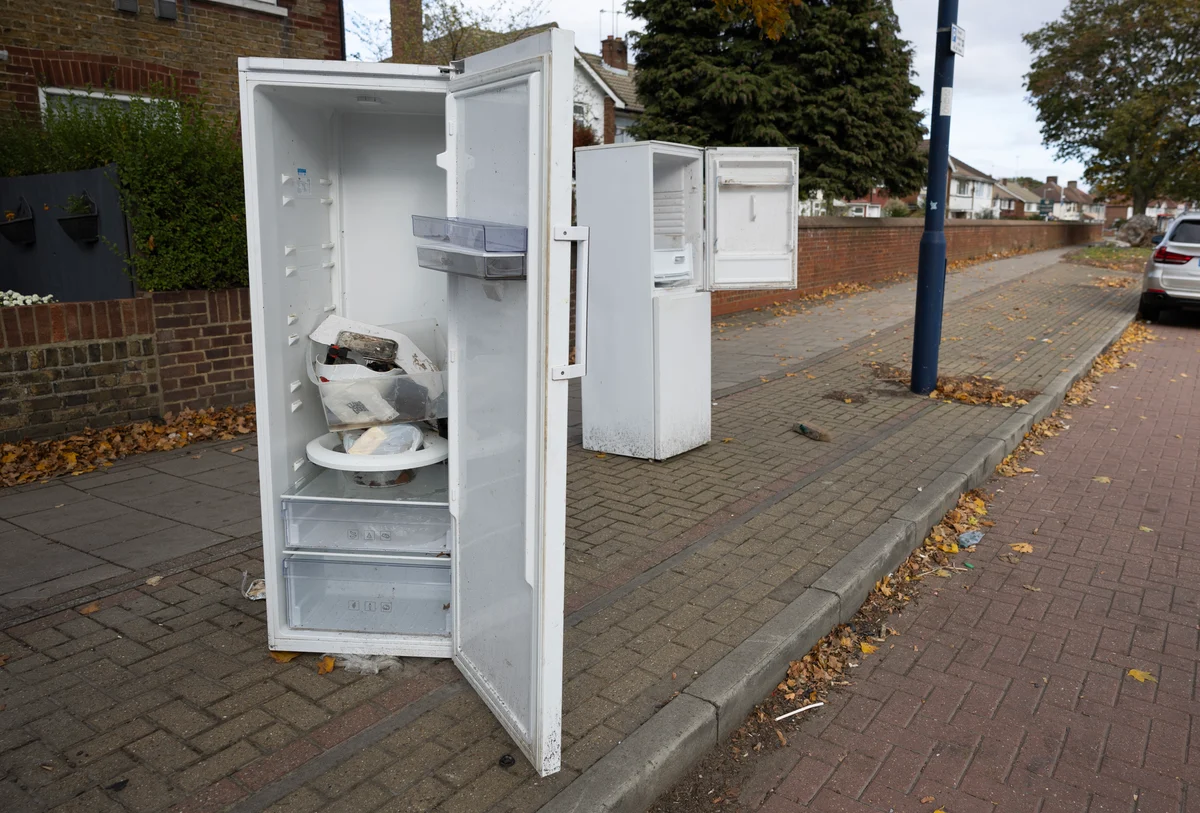Copyright standard

Dumped fridges, a felled tree left to rot, and household waste floating in the breeze… perhaps not what a tourist would expect to see when they arrive in London, after leaving its most famous airport. But that’s exactly what greets people as they drive past Heathrow’s northern perimeter on their way towards Central London. Last week I headed out to Harlington near Hayes to interview residents, after hearing things were getting out of hand with fly-tipping in their cul-de-sac. But I didn’t make it as far as their street before the scale of the issue became clear. Travelling on the H91 bus down Bath Road in Harlington, right next to Heathrow Airport, I noticed two fridges dumped on the side of the road. As I got off the bus, I could see rubbish blowing in the wind from what appear to be fly-tipping hotspots just steps away from the discarded fridges (themselves filled with more rubbish). The exact part of Bath Road is just meters away from the Premier Inn London Heathrow Terminal 2 & 3. My first thought was “This isn’t a great selling point for first time tourists visiting London”. I headed towards Craneswater, to conduct my interview, just two minutes down the road, when I noticed more rubbish, and a dumped sofa. I asked residents of the cul-de-sac, itself suffering from floating litter and fly-tipping, if this was a regular occurrence, to which I was told: “Yes, it’s gotten worse, but it’s always been there.” Minreet Kaur, 45, told the Local Democracy Reporting Service (LDRS) that the neighbourhood is plagued by fly-tipping, and claims it’s rarely ever collected or dealt with quickly by Hillingdon Council. The council says it’s actively investigating the issue. Whilst speaking to Minreet inside her neighbour’s living room, I witnessed council employees remove the dumped sofa, but leave the rest of the rubbish. Shortly after, I headed outside to see if the two fridges they had driven past on the way in had also been collected, but they were still there. “They don’t come straight away, and sometimes they don’t come back at all, I’ve been monitoring it. They ask for the road name but take days to respond if they do. Our area has been neglected.” Minreet added: “The council just don’t care. Our council tax is going up, but it’s like the work they’re doing is less. We’ve lived here all my life, now we want to move.” A Hillingdon Council spokesperson told me: “There is an active investigation underway to address fly-tipping and reports of antisocial behaviour reported by residents in this area. Additional environmental enforcement patrols will be conducted over the coming weeks and we have an action day planned with partners to further investigate residents’ concerns. “There is no excuse for fly-tipping in our borough, with the council providing plenty of convenient, free or low-cost options to dispose of waste. We share residents’ frustrations that the actions of a minority of irresponsible people harms the environment and blights our neighbourhoods, and we’ll continue to take action against those caught.” Our photographer and I decided to take a stroll around the area to get a feel for the place as I hoped to understand whether this was just one missed opportunity to clear waste, or whether as Minreet said, the neighbourhood was plagued by fly-tipping. Just five minutes up the road, my questions were answered. Whilst I encountered similar amounts of dumped household rubbish bags, what I was not prepared for was two fly-tipping sites, both piled a few feet tall with rubbish, one of which had evidently been set on fire at some point. The site was filled with rubbish, nappies, unwanted clothes, and parts of the frame from a car – this time on Cranford Lane. As part of our enquiries with Hillingdon Council on October 29, I informed the local authority of the fly-tipping hotspots I had encountered. However, according to Minreet, they still haven’t been cleared six days later, instead they’ve been added to. “I’m a runner, I wouldn’t run around here anymore. I drive to Osterley Park and run there, it’s disgusting around here, and it just doesn’t make you feel safe,” Minreet tells me as a car speeds past with a man screaming out the window, in what appeared to be an attempt to make us jump. “That’s exactly what I mean,” she added. Linda Mahwinney, 78, has lived in Craneswater for over half a century. She said she feels “exasperated” seeing people treat her road like a town dump. However, it isn’t just fly-tippers that are making her feel this way, but Heathrow private hire drivers waiting for a job from the airport. Linda and Minreet described how drivers park up in their cul-de-sac, loitering and littering past 9pm. Linda said she often goes out and clears up after them. She said: “I’m really proud of where I live, but I’m doing the council’s job.” She added: “I used to walk better, I would pick it up myself – I have multiple sclerosis – but if I don’t then it’d just blow around.” Both Minreet and Linda say they have witnessed these chauffeurs defecating in the bushes and urinating in bottles, which they discard onto the street. This is despite a council-enforced PSPO (Public Space Protection Order) which is supposed to prevent exactly this sort of behaviour. Minreet said: “I’ve had to call the police before. The council just tell us to take a photo or video, but if we do they may have to share this with the chauffeurs. That puts us at risk of being identified based on where the video is taken from; we can’t risk that. “I don’t understand why they can’t put up a camera or monitor the area. I care for my mum, my parents are elderly people, but like them we are all too scared to say or do anything… my mum is scared to go out for a walk.” A Hillingdon Council spokesperson said, of the issue around private hire drivers: “Unfortunately, CCTV camera footage does not always guarantee identification. To be able to take enforcement action we require evidence of the offences being committed, which residents play an important role in gathering and we always work with them to ensure this is done safely. “Our taxi and PHV Public Spaces Protection Order was introduced earlier this year following concerns raised by residents living in the wards near the airport to provide increased enforcement options to deter problematic behaviour, which saw 7,954 FPNs (Fixed Penalty Notices) issued in the first six months.”



